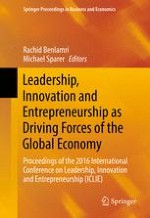2017 | OriginalPaper | Chapter
36. Intercultural Competencies for Career Advancement: A Comparative Study of Managerial Competencies in United Arab Emirates and Malaysia
Authors : Diana J. Haladay, Rommel Pilapil Sergio, Ahmed M. Makki, Zainal Abu Zarim, Mohd Nor Ismail
Published in: Leadership, Innovation and Entrepreneurship as Driving Forces of the Global Economy
Publisher: Springer International Publishing
Activate our intelligent search to find suitable subject content or patents.
Select sections of text to find matching patents with Artificial Intelligence. powered by
Select sections of text to find additional relevant content using AI-assisted search. powered by
